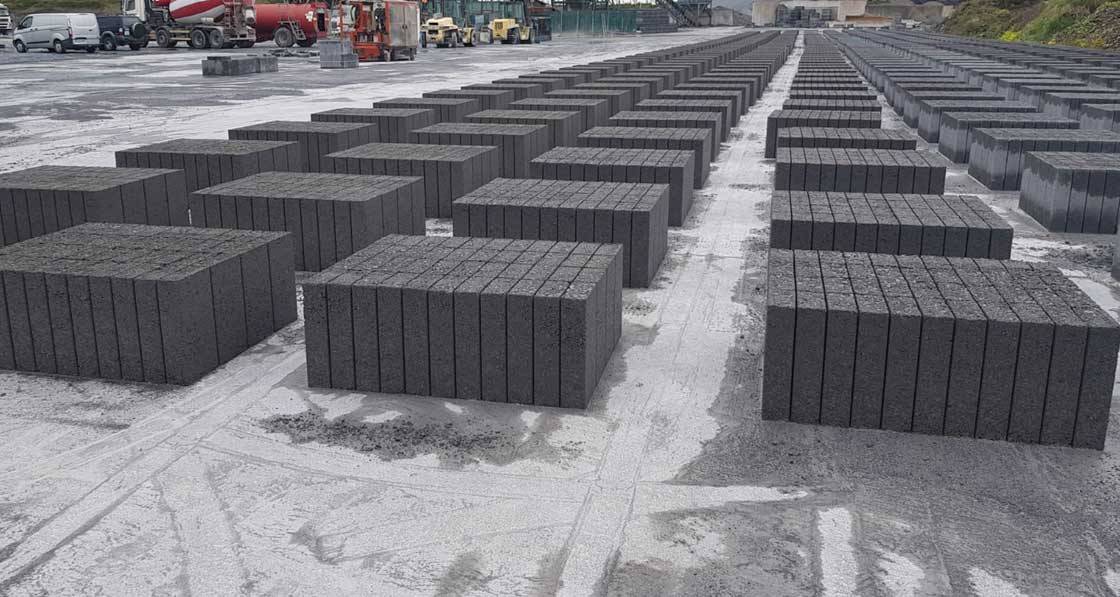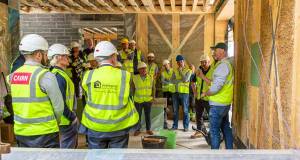
- Marketplace
- Posted
Low carbon concrete blocks now available in Ireland
Low carbon concrete blocks are now widely available on the Irish market – bringing up to 50% reductions in embodied CO2 – and Passive House Plus helped make it happen.
This article was originally published in issue 31 of Passive House Plus magazine. Want immediate access to all back issues and exclusive extra content? Click here to subscribe for as little as €10, or click here to receive the next issue free of charge
Innovative Galway-based concrete product manufacturer Coshla Quarries has recently started making blockwork with Ecocem’s green cement, replacing carbon-intensive portland cement with ground granulated blastfurnace slag (GGBS) in blockwork manufacturing at quantities of up to 50% replacement – creating a stronger block at no extra costs, and with no production delays. Consequently Ecocem are now offering specification clauses for GGBS blocks.
For several years Passive House Plus editor Jeff Colley had enquired as to why GGBS wasn’t being used in blockwork manufacturing at anything other than negligible percentages.
The answer? Timing.
Concrete products made with portland cement at a typical open air blockwork manufacturing plant typically take 2-3 days to dry, subject to weather conditions – or 4-5 days with GGBS at 50% substitution, and higher still as GGBS percentages increase. With time-sensitive applications like blockwork – where the onus is on reaching early stage strength to enable the blocks to be banded, lifted and stacked quickly – GGBS blocks had been ruled out. But Colley heard via sustainability consultant Jay Stuart that Darragh Lynch, an architect working on the Ballymun Regeneration project, had persuaded Kilsaran to make blocks using GGBS in 2012 for the project’s last phase. With little activity on in the industry at the time, Kilsaran had the time to experiment, and blockwork for the scheme was made at 50% GGBS without a hitch.
When airtightness tester Wayne Hession approached Passive House Plus about his own cavity wall passive house project in February 2018, Jeff Colley told Hession about the GGBS blockwork option, and after speaking to Darragh Lynch, Hession approached Martin Collins, general manager of Coshla Quarries about making GGBS blocks for his house. Collins engaged with Ecocem’s technical development manager John Reddy, who then developed an accelerant to enable blocks with 50% GGBS to be manufactured without increasing production time or costs.
According to Collins, experiments with the ratios of cement, accelerant and aggregate established that 1% accelerant was the optimum amount. Ecocem’s GGBS, which is a steel industry byproduct, offers a 96% reduction in CO2 compared to portland cement, according to the company’s Environmental Product Declaration for the Irish market. According to Martin Collins, this initiative has been so successful, Coshla Quarries have switched over to GGBS wholesale.
“All my blocks now have 50% GGBS in them,” says Collins. Coshla are now manufacturing to an average compressive strength of roughly 12.5 newtons, taking account of severe west of Ireland conditions. Other than a slightly lighter colour, there’s no apparent difference in the blocks, other than a slightly smoother finish than conventional blocks, due to GGBS being finer than cement. Wayne Hession – a seasoned airtightness tester – believes the precision finish of the blocks will provide an inherent airtightness benefit – potentially giving the product a thermal performance benefit to compliment its embodied energy reductions. Ecocem are planning to conduct testing in that regard.







